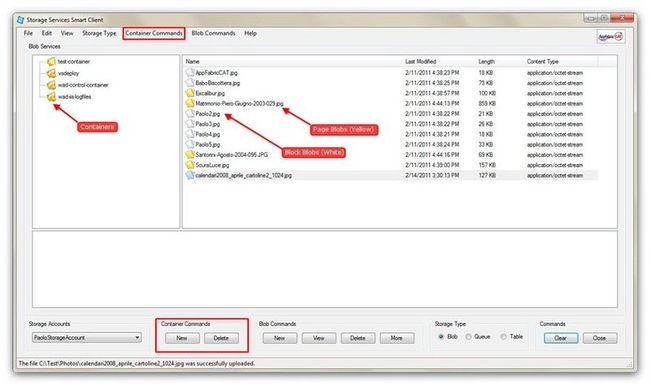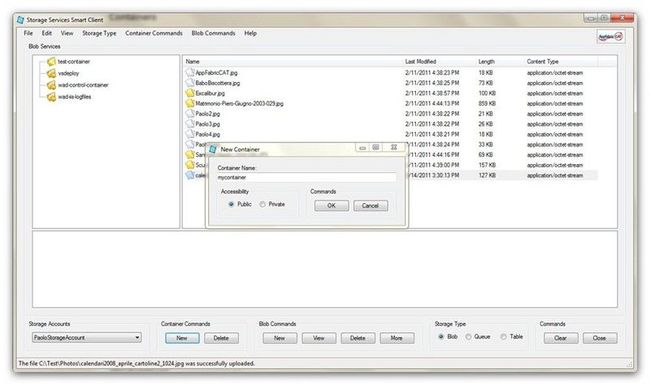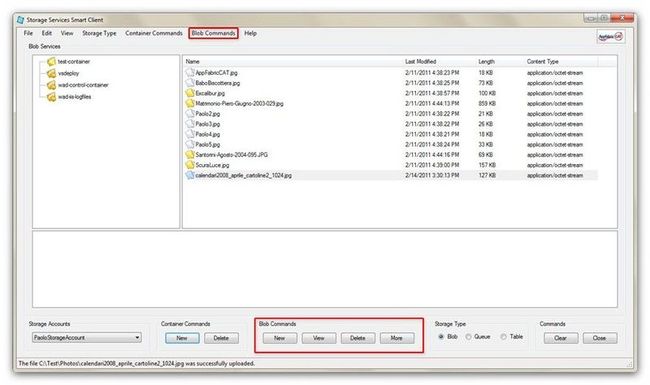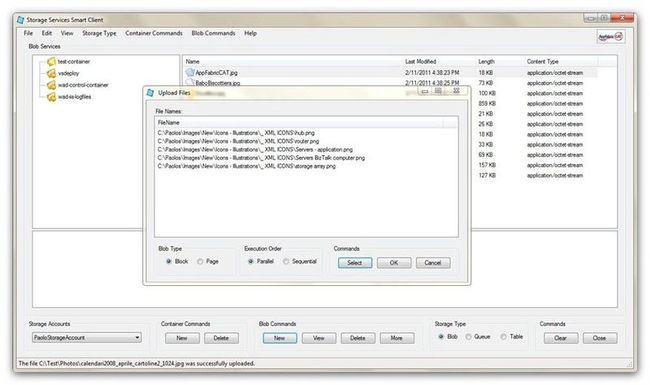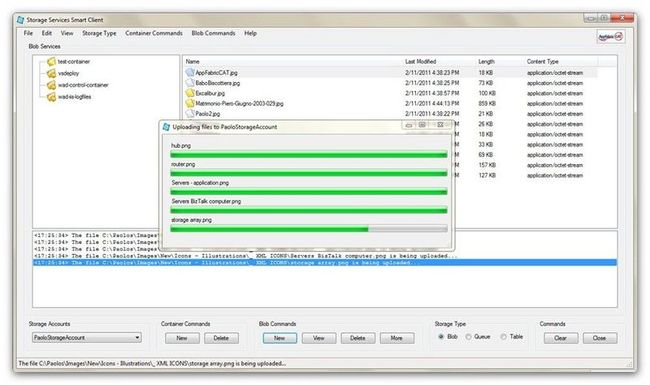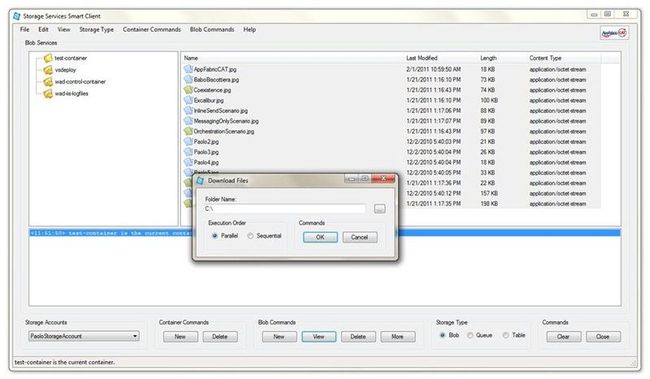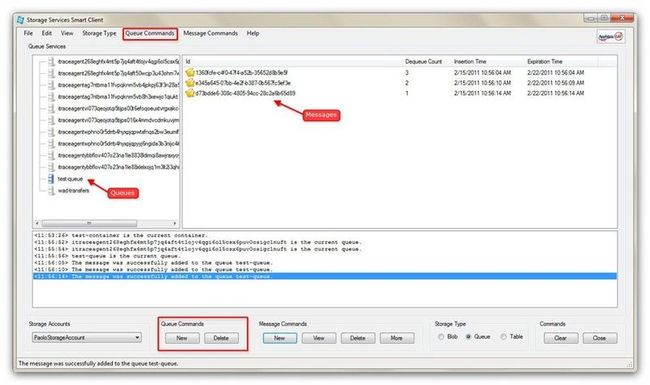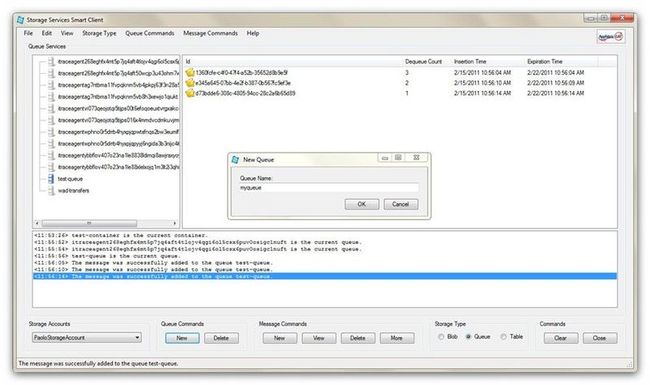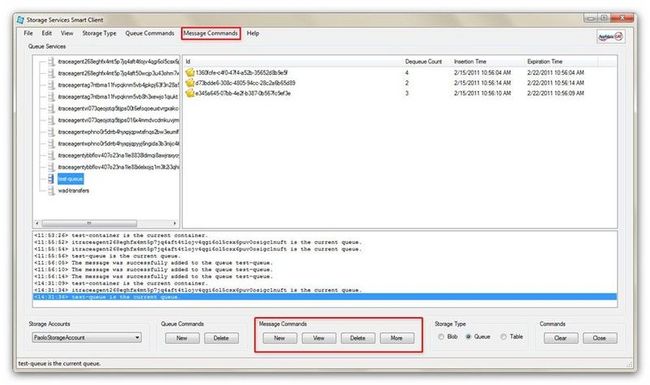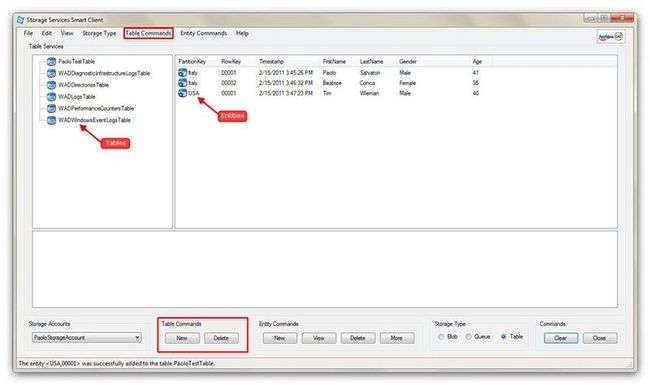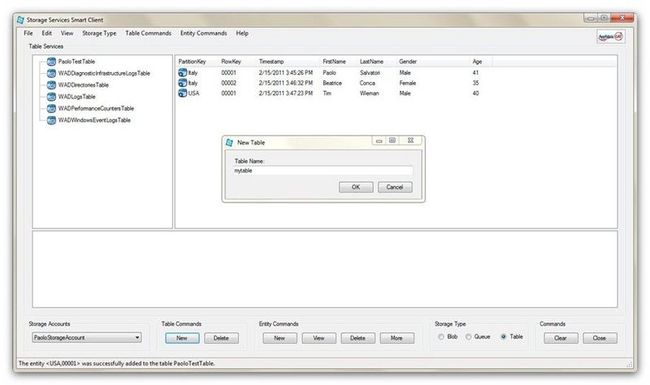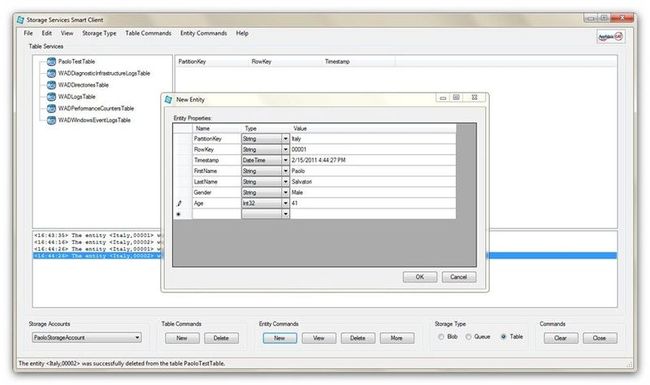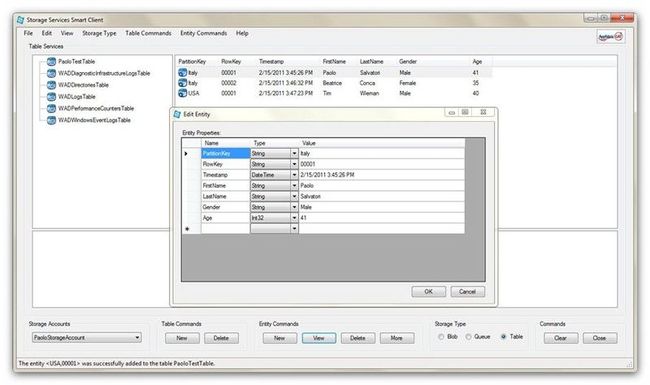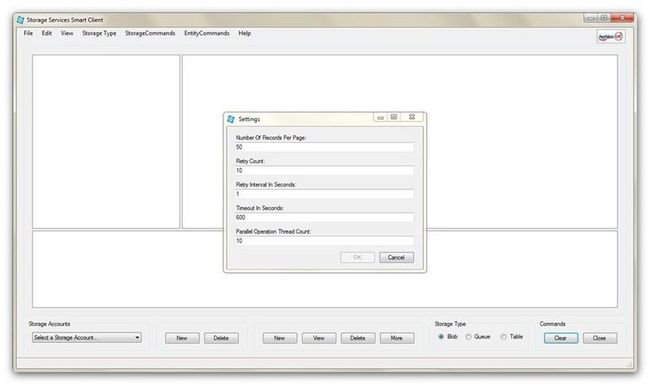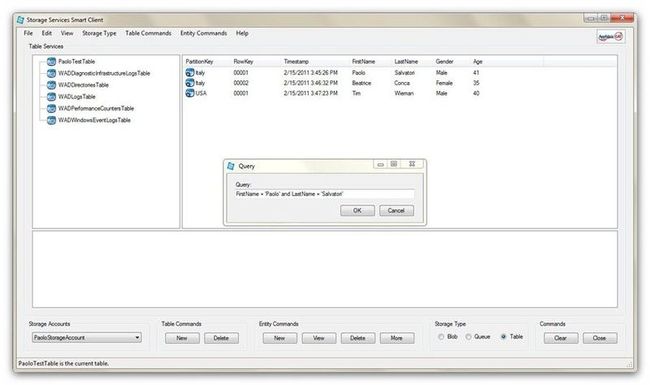通过构建 Storage Explorer 应用学习Windows Azure Storage APIs
简介
Windows Azure 平台提供不同的存储服务来存储瞬态和持久态的数据:
- 无结构二进制和文本数据Unstructured binary and text data
- 二进制和文本消息Binary and text messages
- 结构化数据Structured data
为了支持这些类型的数据, Windows Azure 提供三种不同的存储服务: Blobs,Queues,和 Tables。
下表列出了三种存储服务的异同:
| 存储类型 |
URL schema |
最大大小 |
推荐 用途 |
| Blob |
http://[StorageAccount].blob.core.windows.net/[ContainerName]/[BlobName] |
Block Blob:最大200GB |
存储大尺寸二进制和文本文件 |
| Queue |
http://[StorageAccount].queue.core.windows.net/[QueueName] |
8 KB |
在本地和云端进行可靠的,持久态的消息通信。小尺寸二进制和文本消息 |
| Table |
http://[StorageAccount].table.core.windows.net/[TableName]?$filter=[Query] |
数据表可以无限大。实体最大1 MB. |
由多个属性组成的可查询的结构化实体 |
本地和云端各种大型客户端应用都可以通过RESTful 接口无缝的访问存储服务。可以使用微软,第三方或者开发技术来实现使用存储服务的应用:
- .NET Framework : 本地或 云端.NET 应用通过Windows Azure SDK 中的Windows Azure Storage Client Library 来访问存储服务。
- Java : Windows Azure SDK for Java 使得Java程序也能便捷的访问Windows Azure存储服务。该SDK 包含在Windows Azure Tools for Eclipse 项目中。另外, AppFabric SDK for Java 使得Java项目也能使用Windows Azure AppFabric 中的 service bus 和 access control服务。
- PHP : Windows Azure SDK for PHP 使得 PHP 能够访问 Windows Azure 存储服务。
更多存储服务的信息参见如下:
- "About the Storage Services API " on MSDN.
- "Using the Windows Azure Storage Services " on MSDN.
- "Understanding Data Storage Offerings on the Windows Azure Platform " on TechNet.
Blob Service
Blob 服务提供二进制文件和文本文件的存储。通过Blob的 REST API 能够访问2种资源: Containers 和 Blobs 。容器可以看做包含多个文件的文件夹,而blob便是属于某个容器的文件。有如下2种blob:
- Block Blobs : 该类型用于流式访问。
- Page Blobs: 该类型用于随机读写操作,能够向blob中写入一部分字节。
容器和blob支持用户定义的元数据, 在请求操作的头部填入相应的名值对 。使用 REST API,开发者可以创建和文件系统类似的层次性命名。Blob 名可以加入配置路径分隔符。举例,MyGroup/MyBlob1 和 MyGroup/MyBlob2 意味着一个虚拟的组织层级。 Blob的枚举操作支持虚拟层级的遍历。所以,你可以放回某个组下面的所有blob。例如,您可以返回MyGroup 下的所有blob。
Block Blobs 可以通过2种方法创建。 不超过64MB 的Block blobs 可以通过调用Put Blob 操作进行上传。大于64 MB的 Block blobs 必须分块上传,每块不超过4MB。当所有的分块成功上传之后,通过调用Put Block List 操作进行合并,成为单个连续的blob。Block blob目前最大支持200GB。
Page blobs 可以由调用Put Blob 操作来创建和初始化,支持最大尺寸。通过调用Put Page 操作,向page blob写入内容。Page blob 目前最大支持 1 TB。
Blobs 支持条件更新,更多请参见:
- "Understanding Block Blobs and Page Blobs " on MSDN.
- "Blob Service Concepts " on MSDN.
- "Blob Service API " on MSDN.
- "Windows Azure Storage Client Library " on MSDN.
Queue Service
Queue 服务提供本地和云端应用,或同一Windows Azure应用的不同role之间可靠的持久态消息通信。通过REST API 可以访问2种实体: Queues 和 Messages . Queues 支持用户定义的元数据,在请求操作的头部填入相应的名值对。每个存储账户可以拥有无限的消息队列。每个消息队列可以拥有无数的消息。单条消息最大8 KB。当从队列读取消息之后,消耗者应该处理该消息,并随后删除它。消息被读取之后,在特定间隔内,对于其他消耗者是不可见的。当间隔到期,而消息又没有被删除,其他消耗者便能访问该消息。更多请见:
- "Queue Service Concepts " on MSDN.
- "Queue Service API " on MSDN.
- "Windows Azure Storage Client Library " on MSDN.
Table Service
Table 服务提供结构化存储。Table 服务支持与 WCF Data Services REST API 兼容的REST API 。开发者可以使用.NET Client Library for WCF Data Services 来访问 Table 服务。一个存储账号内,开发者可以创建多个表。每个表由唯一的名称和存储账户标示。 Tables 将数据存储为实体。一个实体便是由命名属性和相关的值组成的集合。Tables 被划分在不同存储节点内,以便能够支持负载平衡。每个表的第一个属性: partition key,指明了该实体如何被划分。 第二个属性 : row key,能够确定在某个分区内的实体。Partition key 和row key 结合可以作为实体的主键。任何情况下,都应该把tables当做.NET Dictionary 对象,而不是关系型数据库内的表。实际上,每张table都是相互独立的, Table 服务并不支持多张表的join操作��如果你需要完全的云端关系型数据库,可以试试SQL Azure 。另一不同是,table并不像传统关系型数据库那样必须拥有schema。换言之,同一个table内的实体不必暴露相同的属性。更多请见:
- "Table Service Concepts " on MSDN.
- "Table Service API " on MSDN.
- "Windows Azure Storage Client Library " on MSDN.
- "Understanding the Table Service Data Model " on MSDN.
- "Querying Tables and Entities " on MSDN.
- "Client Applications of ADO.NET Data Services " on MSDN.
Solution
在冗长而又必须的简介之后,我们试着写一些代码。在调研期间,我发现了几个相当不错的工具来管理Windows Azure 存储服务的数据。其中,Neudesic 编写的 Azure Storage Explorer 最为出色。既然要学习某个技术,最好便是能用其解决一些问题。我打算创建一个Windows Forms 应用来处理 to handle Windows Azure Storage Services: Blobs, Queues 和 Tables。下图是应用的架构:
创建一个 CloudStorageHelper 类库,封装和拓展了 Windows Azure Storage Client Library 提供的功能。实际上,互联网上有许多sample代码,例如 Windows Azure Code Samples 。
CloudStorageAccount 和 配置
Windows Azure Storage Client Library 包含了 CloudStorageAccount 类,用于检索配置文件中的账户信息和验证凭证。该类的 FromConfigurationSetting 静态方法会用特定的配置设置创建一个新的 CloudStorageAccount 实例。该方法仅当在SetConfigurationSettingPublisher 方法被调用以配置全局的configuration setting publisher 之后才能被调用。以下是我的应用的配置:
| <?xml version="1.0"?> <configuration> <configSections> <section name="storageAccounts" type="System.Configuration.DictionarySectionHandler, </configSections> <system.diagnostics> <trace autoflush="true" indentsize="4"> <listeners> <clear/> <add name="LogTraceListener" type="Microsoft.AppFabric.CAT.WindowsAzure.Samples.StorageServicesSmartClient.LogTraceListener, initializeData="" /> </listeners> </trace> </system.diagnostics> <storageAccounts> <add key="LocalStorageAccount" value="UseDevelopmentStorage=true"/> <add key="PaoloStorageAccount" value="DefaultEndpointsProtocol=https;AccountName=paolosalvatori;AccountKey=..."/> </storageAccounts> <appSettings> <add key="debug" value="true"/> <add key="retryCount" value="10"/> <add key="retryInterval" value="1"/> <add key="timeout" value="600"/> <add key="pageSize" value="50"/> <add key="parallelOperationThreadCount" value="10"/> </appSettings> <system.net> <connectionManagement> <add address="*" maxconnection="50"/> </connectionManagement> </system.net> <startup> <supportedRuntime version="v4.0" sku=".NETFramework,Version=v4.0"/> </startup> </configuration> |
配置文件包含storageAccounts ,该段用于定义存储账户信息。 LocalStorageAccount 项包含开发用存储的连接字符串,开发用存储账户都是一样的,所以只要指明UseDevelopmentStorage=true 便可。而第二个元素, PaoloStorageAccount 包含了存储账户的连接字符串。 连接字符串如下格式:DefaultEndpointsProtocol=[http|https];AccountName=myAccountName;AccountKey=myAccountKey
更多请见:
- "How to Configure Connection Strings " on MSDN.
应用启动阶段, MainForm 构建函数内创建了一个CloudStorageHelper 实例,之后检索配置文件内的账户信息。
| public partial class MainForm : Form { ... public MainForm() { InitializeComponent(); mainForm = this; this.cloudStorageHelper = new CloudStorageHelper(); GetStorageAccountsFromConfiguration(); } ... private void GetStorageAccountsFromConfiguration() { try { if (cloudStorageHelper == null) { return; } Hashtable hashtable = ConfigurationManager.GetSection(StorageAccounts) as Hashtable; if (hashtable == null || hashtable.Count == 0) { WriteToLog(StorageAccountsNotConfigured); } cloudStorageHelper.StorageAccounts = new Dictionary<string, string>(); IDictionaryEnumerator e = hashtable.GetEnumerator(); while (e.MoveNext()) { if (e.Key is string && e.Value is string) { cloudStorageHelper.StorageAccounts.Add(e.Key as string, e.Value as string); } } cboStorageAccount.Items.Add(SelectAStorageAccount); if (cloudStorageHelper.StorageAccounts != null) { cboStorageAccount.Items.AddRange(cloudStorageHelper.StorageAccounts.Keys.ToArray()); } cboStorageAccount.SelectedIndex = 0; } catch (Exception ex) { HandleException(ex); } } } |
当启动应用时,你可以通过下拉列表选择不同的存储账户,见下图:
选择之后,程序会调用 CreateCloudStorageAccount 方法,依次创建CloudStorageAccount 实例。
| public class CloudStorageHelper { /// <summary> /// Initializes the CloudStorageAccount object using the information /// contained in the storageAccounts section in the configuration file. /// </summary> public void CreateCloudStorageAccount() { if (storageAccounts == null) { throw new ApplicationException(StorageAccountsDictionaryCannotBeNull); } if (string.IsNullOrEmpty(storageAccount)) { throw new ApplicationException(CurrentStorageAccountCannotBeNull); } if (storageAccounts.ContainsKey(storageAccount)) { string storageAccountNameAndSharedKey = storageAccounts[storageAccount] as string; if (!string.IsNullOrEmpty(storageAccountNameAndSharedKey)) { CloudStorageAccount.SetConfigurationSettingPublisher((configurationSetting, { configurationSettingPublisher(storageAccounts[configurationSetting]); }); cloudStorageAccount = CloudStorageAccount.FromConfigurationSetting(storageAccount); } else { Trace.WriteLineIf(traceEnabled, StorageAccountsNotConfigured); } } } } |
当选择了一个存储账户之后,你可以选择窗口下方的按钮,或上方的菜单来选择管理哪类数据 (Blobs, Queues, Tables) 。
容器
当选择 Blob 时,应用会检索账户下的容器列表,并在左侧面板创建TreeView 。选择某个容器,右侧面板内的ListView 会显示出该容器内的所有Block (以白色文档图标表示) 和 Page Blobs (以��色文档图标表示) 。使用Container Commands 内的 New 或者Delete 按钮,或是菜单对应的选项来创建或删除容器。
创建新容器需如下步骤:
如下是 CloudStorageHelper 内列出,创建和删除容器的代码。
| public class CloudStorageHelper { ... #region Container Methods /// <summary> /// Lists the available containers on the current storage account. /// </summary> /// <returns>The list of containers on the current storage account.</returns> public List<CloudBlobContainer> ListContainers() { if (cloudBlobClient == null) { if (cloudStorageAccount == null) { CreateCloudStorageAccount(); } if (cloudStorageAccount != null) { cloudBlobClient = cloudStorageAccount.CreateCloudBlobClient(); if (string.Compare(cloudBlobClient.Credentials.AccountName, "devstoreaccount1", true) == 0) { cloudBlobClient.ParallelOperationThreadCount = 1; } else { cloudBlobClient.ParallelOperationThreadCount = parallelOperationThreadCount; } cloudBlobClient.Timeout = TimeSpan.FromSeconds(timeout); cloudBlobClient.RetryPolicy = RetryPolicies.RetryExponential(retryCount, } } if (cloudBlobClient != null) { return new List<CloudBlobContainer>(cloudBlobClient.ListContainers()); } else { return null; } }
/// <summary> /// Creates a container on the current storage account. /// </summary> /// <param name="name">The container name.</param> /// <param name="accessibility">The container accessibility.</param> /// <returns>True if the container is successfully created, false otherwise.</returns> public bool CreateContainer(string name, Accessibility accessibility) { if (string.IsNullOrEmpty(name)) { throw new ArgumentException(ContainerNameCannotBeNull); } CloudBlobContainer container = cloudBlobClient.GetContainerReference(name.ToLower()); bool ok = container.CreateIfNotExist(); if (ok) { BlobContainerPermissions blobContainerPermissions = new BlobContainerPermissions(); blobContainerPermissions.PublicAccess = accessibility == Accessibility.Public ? container.Metadata.Add(new NameValueCollection() { { CreatedBy, Environment.UserDomainName } }); container.SetPermissions(blobContainerPermissions); Trace.WriteLineIf(traceEnabled, string.Format(CultureInfo.CurrentCulture, } return ok; }
/// <summary> /// Deletes a container on the current storage account. /// </summary> /// <param name="name">The container name.</param> public void DeleteContainer(string name) { if (string.IsNullOrEmpty(name)) { throw new ArgumentException(ContainerNameCannotBeNull); } CloudBlobContainer container = cloudBlobClient.GetContainerReference(name); container.Delete(); Trace.WriteLineIf(traceEnabled, string.Format(CultureInfo.CurrentCulture, } #endregion ... } |
Blobs
通过Blob Commands 组内的按钮或者相应的菜单项来管理blob。
如上图,点击 New 按钮,应用会让您选择需要上传的多个文件。
Upload Files 对话框允许您选择Blob 类型 (Block 或 Page ) ,以及执行模式 (Parallel 或 Sequential )。当您选择 Parallel 模式,应用会启动独立并发的上传 Task 。相反,当选择 Sequential 模式,应用会顺序上传文件。当你点击 OK 按钮,应用便会开始上传,并显示进度。
你也可以多选blob,然后按Delete 按钮来删除。或者按View 按钮来下载 blobs 。后者同样会出现Download Files 对话框,选择执行模式, Parallel 或 Sequential 。
下表包含了CloudStorageHelper 内用于列出,上传,下载和删除block 和 page blobs的函数。 例如 UploadBlob 方法,其参数如下:
- BlobFileInfo 对象列表,表示每个文件的属性 (文件名, 容器名, Blob类型。)
- 上传执行模式: Parallel 或Sequential 。
- 显示上传进度的事件处理程序。
- 上传完成时执行的Action 。
当选择 Sequential 模式, UploadBlob 方法使用TaskFactory 来创建启动 Task 。遍历blobFileInfoList ,为每个文件启动一个新的,独立的 Task 。 相反,当选择Parallel 模式时, UploadBlob 同时为每个文件创建独立的Task 。 为了处理上传和下载Page Blobs,我高度定制了如下文章中的代码:
- "Using Windows Azure Page Blobs and How to Efficiently Upload and Download Page Blobs "
我的 UploadFile 方法创建FileStream 来读取需上传文件的内容, 并封装进 ProgressStream 对象。并将progressChangedHandler 事件处理程序赋值给ProgressStream 的ProgressChanged 事件。注意, UploadFile 方法使用CloudBlockBlob 类的 UploadFromStream 方法CloudBlockBlob 类提供了多个上传文件的方法:
- PutBlock : 用于上传block,用于将来的block合并。block 不超过4 MB。上传若干block之后,通过调用PutBlockList 来创建或更新服务器边的blob。每个block在blob内有唯一的ID。
- UploadByteArray : 该方法上传字节数组至 一个 block blob。该方法继承自CloudBlob 类。
- UploadFile : 上传文件至 block blob。该方法继承自CloudBlob 类。
- UploadFromStream : 上传任意数据流至block blob。该方法继承自CloudBlob 类。
- UploadText : 上传文本字符串至block blob。该方法继承自CloudBlob 类。
当blob是Page类型时, UploadFile 使用CloudPageBlob 的WritePages 方法。Page Blobs 包含一系列的page,最小的page大小为512字节,最大4MB(必须为512字节的倍数) 。同样, CloudPageBlob 类包含多个上传方法:
- WritePages : 上传字节数组
- UploadByteArray : 上传字节数组。该方法继承自CloudBlob 类。
- UploadFile : 上传文件。该方法继承自CloudBlob 类。
- UploadFromStream : 上传任意数据流 。该方法继承自CloudBlob 类。
- UploadText : 上传文本字符串。该方法继承自CloudBlob 类。
DownloadBlob 方法实现于UploadFile 类似。DownloadFile 方法使用CloudBlockBlob 的 DownloadToStream 方法下载block blob。对于 Page blob用 BlobStream 对象来读取。更多请见Windows Azure Storage Client Library 。
|
{ ... #region Blob Methods /// <summary> /// Lists the blobs in the specified container. /// </summary> /// <param name="name">The container name.</param> /// <returns>The blobs contained in the specified container.</returns> public ResultSegment<IListBlobItem> ListBlobs(string name) { container = null;
if (string.IsNullOrEmpty(name)) { throw new ArgumentException(ContainerNameCannotBeNull); } container = cloudBlobClient.GetContainerReference(name); return container.ListBlobsSegmented(pageSize, continuationToken, blobRequestOptions); }
/// <summary> /// Returns a blob identified by its absolute URI. /// </summary> /// <param name="absoluteUri">The blob absolute URI.</param> /// <returns>The blob identified by its absolute URI.</returns> public CloudBlob GetBlob(string absoluteUri) { if (container == null) { throw new ArgumentException(CurrentContainerCannotBeNull); } CloudBlob cloudBlob = container.GetBlobReference(absoluteUri); cloudBlob.FetchAttributes(blobRequestOptions); return cloudBlob; }
/// <summary> /// Uploads a list of blobs to the current storage account. /// </summary> /// <param name="blobFileInfoList">The list of blobs to upload.</param> /// <param name="executionOrder">The execution order: sequential or parallel.</param> public void UploadBlob(List<BlobFileInfo> blobFileInfoList, ExecutionOrder executionOrder) { UploadBlob(blobFileInfoList, executionOrder, null, null); }
/// <summary> /// Uploads a list of blobs to the current storage account. /// </summary> /// <param name="blobFileInfoList">The list of blobs to upload.</param> /// <param name="executionOrder">The execution order: sequential or parallel.</param> /// <param name="progressChangedHandler">An event handler to invoke as the upload progresses.</param> /// <param name="action">An action to execute when the last upload has been completed.</param> public void UploadBlob(List<BlobFileInfo> blobFileInfoList, ExecutionOrder executionOrder, EventHandler<ProgressChangedEventArgs> progressChangedHandler, Action action) { try { taskCount = blobFileInfoList.Count; Task task = null;
if (blobFileInfoList == null || blobFileInfoList.Count == 0) { throw new ArgumentException(BlobFileInfoListCannotBeNull); }
if (executionOrder == ExecutionOrder.Sequential) { Task.Factory.StartNew(() => { try { for (int i = 0; i < blobFileInfoList.Count; i++) { task = Task.Factory.StartNew((p) => UploadFile(p), progressChangedHandler, action)); Task.WaitAll(task); } } catch (AggregateException ex) { ex.Handle((e) => { HandleException(e); return true; }); } catch (Exception ex) { HandleException(ex); } }); } else { try { for (int i = 0; i < blobFileInfoList.Count; i++) { FileInfo fileInfo = new FileInfo(blobFileInfoList[i].FileName); blobFileInfoList[i].Length = fileInfo.Length; Task.Factory.StartNew((p) => UploadFile(p), progressChangedHandler, action)); } } catch (AggregateException ex) { ex.Handle((e) => { HandleException(e); return true; }); } catch (Exception ex) { HandleException(ex); } } } catch (Exception ex) { HandleException(ex); } }
/// <summary> /// Uploads a file described by the argument. /// </summary> /// <param name="info">A BlobFileInfo object describing the file to upload.</param> /// <param name="progressChangedHandler">An event handler to invoke as the download progresses.</param> /// <param name="action">An action to execute when the last upload has been completed.</param> public void UploadFile(BlobFileInfo info, EventHandler<ProgressChangedEventArgs> progressChangedHandler, Action action) { try { CloudBlobContainer container = cloudBlobClient.GetContainerReference(info.ContainerName); CloudBlob cloudBlob = container.GetBlobReference(Path.GetFileName(info.FileName)); Trace.WriteLineIf(traceEnabled, switch (info.BlobType) { case BlobType.Block: CloudBlockBlob cloudBlockBlob = cloudBlob.ToBlockBlob; using (FileStream fileStream = new FileStream(info.FileName, { using (ProgressStream progressStream = new ProgressStream(info.Index, fileStream)) { progressStream.ProgressChanged += new cloudBlockBlob.UploadFromStream(progressStream, } } break; case BlobType.Page: long totalUploaded = 0; long vhdOffset = 0; int offsetToTransfer = -1; CloudPageBlob cloudPageBlob = cloudBlob.ToPageBlob; long blobSize = RoundUpToPageBlobSize(info.Length); cloudPageBlob.Create(blobSize, using (FileStream fileStream = new FileStream(info.FileName, { using (ProgressStream progressStream = new ProgressStream(info.Index, fileStream)) { progressStream.ProgressChanged += BinaryReader reader = new BinaryReader(progressStream);
while (vhdOffset < info.Length) { byte[] range = reader.ReadBytes(FourMegabytesAsBytes);
int offsetInRange = 0;
// Make sure end is page size aligned if ((range.Length % PageBlobPageSize) > 0) { int grow = (int)(PageBlobPageSize - (range.Length % PageBlobPageSize)); Array.Resize(ref range, range.Length + grow); }
// Upload groups of contiguous non-zero page blob pages. while (offsetInRange <= range.Length) { if ((offsetInRange == range.Length) || IsAllZero(range, offsetInRange, PageBlobPageSize)) { if (offsetToTransfer != -1) { // Transfer up to this point int sizeToTransfer = offsetInRange - offsetToTransfer; MemoryStream memoryStream = new MemoryStream(range, cloudPageBlob.WritePages(memoryStream, vhdOffset + offsetToTransfer); totalUploaded += sizeToTransfer; offsetToTransfer = -1; } } else { if (offsetToTransfer == -1) { offsetToTransfer = offsetInRange; } } offsetInRange += PageBlobPageSize; } vhdOffset += range.Length; } } } break; } Trace.WriteLineIf(traceEnabled, } finally { lock (this) { taskCount--; if (taskCount == 0 && action != null) { action(); } } } }
/// <summary> /// Downloads a list of blobs from the current storage account. /// </summary> /// <param name="blobFileInfoList">The list of blobs to upload.</param> /// <param name="executionOrder">The execution order: sequential or parallel.</param> public void DownloadBlob(List<BlobFileInfo> blobFileInfoList, ExecutionOrder executionOrder) { DownloadBlob(blobFileInfoList, executionOrder); }
/// <summary> /// Downloads a list of blobs from the current storage account. /// </summary> /// <param name="blobFileInfoList">The list of blobs to upload.</param> /// <param name="executionOrder">The execution order: sequential or parallel.</param> /// <param name="progressChangedHandler">An event handler to invoke as the download progresses.</param> /// <param name="action">An action to execute when the last upload has been completed.</param> public void DownloadBlob(List<BlobFileInfo> blobFileInfoList, ExecutionOrder executionOrder, EventHandler<ProgressChangedEventArgs> progressChangedHandler, Action action) { try { taskCount = blobFileInfoList.Count; Task task = null;
if (blobFileInfoList == null || blobFileInfoList.Count == 0) { throw new ArgumentException(BlobFileInfoListCannotBeNull); }
if (executionOrder == ExecutionOrder.Sequential) { Task.Factory.StartNew(() => { try { for (int i = 0; i < blobFileInfoList.Count; i++) { task = Task.Factory.StartNew((p) => DownloadFile(p), progressChangedHandler, action)); Task.WaitAll(task); } } catch (AggregateException ex) { ex.Handle((e) => { HandleException(e); return true; }); } catch (Exception ex) { HandleException(ex); } }); } else { try { for (int i = 0; i < blobFileInfoList.Count; i++) { long length = blobFileInfoList[i].CloudBlob.Properties.Length; blobFileInfoList[i].Length = length; Task.Factory.StartNew((p) => DownloadFile(p), progressChangedHandler, action)); } } catch (AggregateException ex) { ex.Handle((e) => { HandleException(e); return true; }); } catch (Exception ex) { HandleException(ex); } } } catch (AggregateException ex) { ex.Handle((e) => { HandleException(e); return true; }); } }
/// <summary> /// Uploads a file described by the argument. /// </summary> /// <param name="info">A BlobFileInfo object describing the file to upload.</param> /// <param name="progressChangedHandler">An event handler to invoke as the download progresses.</param> /// <param name="action">An action to execute when the last upload has been completed.</param> public void DownloadFile(BlobFileInfo info, EventHandler<ProgressChangedEventArgs> progressChangedHandler, Action action) { try { CloudBlob cloudBlob = info.CloudBlob; string filePath = Path.Combine(info.LocalFolder, info.FileName); Trace.WriteLineIf(traceEnabled, switch (info.BlobType) { case BlobType.Block: CloudBlockBlob cloudBlockBlob = cloudBlob.ToBlockBlob; using (FileStream fileStream = new FileStream(filePath, { using (ProgressStream progressStream = new ProgressStream(info.Index, { progressStream.ProgressChanged += cloudBlockBlob.DownloadToStream(progressStream, } } break; case BlobType.Page: CloudPageBlob cloudPageBlob = cloudBlob.ToPageBlob; using (FileStream fileStream = new FileStream(filePath, FileMode.Create, { fileStream.SetLength(info.Length); using (ProgressStream progressStream = new ProgressStream(info.Index, { progressStream.ProgressChanged += IEnumerable<PageRange> pageRanges = cloudPageBlob.GetPageRanges(); BlobStream blobStream = cloudPageBlob.OpenRead();
foreach (PageRange range in pageRanges) { int rangeSize = (int)(range.EndOffset + 1 - range.StartOffset);
for (int subOffset = 0; subOffset < rangeSize; subOffset += FourMegabytesAsBytes) { int subRangeSize = Math.Min(rangeSize - subOffset, FourMegabytesAsBytes); blobStream.Seek(range.StartOffset + subOffset, SeekOrigin.Begin); progressStream.Seek(range.StartOffset + subOffset, SeekOrigin.Begin);
byte[] buffer = new byte[subRangeSize];
blobStream.Read(buffer, 0, subRangeSize); progressStream.Write(buffer, 0, subRangeSize); } } } } break; } Trace.WriteLineIf(traceEnabled, string.Format(CultureInfo.CurrentUICulture, } finally { lock (this) { taskCount--; if (taskCount == 0 && action != null) { action(); } } } }
/// <summary> /// Delets a a blob from the current storage account. /// </summary> /// <param name="blobFileInfoList">The list of blobs to delete.</param> public void DeleteBlob(BlobFileInfo info) { if (info != null) { CloudBlob cloudBlob = new CloudBlob(info.AbsoluteUri as string, cloudBlobClient); cloudBlob.DeleteIfExists(); Trace.WriteLineIf(traceEnabled, } }
/// <summary> /// Delets a list of blobs from the current storage account. /// </summary> /// <param name="blobFileInfoList">The list of blobs to delete.</param> public void DeleteBlob(List<BlobFileInfo> blobFileInfoList) { if (blobFileInfoList != null) { for (int i = 0; i < blobFileInfoList.Count; i++) { try { CloudBlob cloudBlob = new CloudBlob(blobFileInfoList[i].AbsoluteUri as string, cloudBlob.DeleteIfExists(); Trace.WriteLineIf(traceEnabled, string.Format(CultureInfo.CurrentCulture, } catch (Exception ex) { HandleException(ex); } } } } #endregion ... } |
为了控制并行度,你可以设置CloudBlobClient 的 ParallelOperationThreadCount 属性。一般而言,设置为逻辑处理器的数量。
Queues
当选择Queue 时,应用会检索账户下所有的队列,并在左侧显示TreeView 。选中某个队列后,右侧会显示该队列所有的信息。
创建新的队列如下:
以下包含了CloudStorageHelper 内列出,创建和删除队列的代码。
| public class CloudStorageHelper { ... #region Queue Methods /// <summary> /// Lists the available queues on the current storage account. /// </summary> /// <returns>The list of queues on the current storage account.</returns> public List<CloudQueue> ListQueues() { if (cloudQueueClient == null) { if (cloudStorageAccount == null) { CreateCloudStorageAccount(); } if (cloudStorageAccount != null) { cloudQueueClient = cloudStorageAccount.CreateCloudQueueClient(); cloudQueueClient.Timeout = TimeSpan.FromSeconds(timeout); cloudQueueClient.RetryPolicy = RetryPolicies.RetryExponential(retryCount, } } if (cloudQueueClient != null) { return new List<CloudQueue>(cloudQueueClient.ListQueues()); } else { return null; } }
/// <summary> /// Creates a queue on the current storage account. /// </summary> /// <param name="name">The queue name.</param> /// <returns>True if the queue is successfully created, false otherwise.</returns> public bool CreateQueue(string name) { if (string.IsNullOrEmpty(name)) { throw new ArgumentException(QueueNameCannotBeNull); }
CloudQueue queue = cloudQueueClient.GetQueueReference(name.ToLower()); bool ok = queue.CreateIfNotExist(); if (ok) { queue.Metadata.Add(new NameValueCollection() { { CreatedBy, Environment.UserDomainName } }); Trace.WriteLineIf(traceEnabled, } return ok; }
/// <summary> /// Deletes a queue on the current storage account. /// </summary> /// <param name="name">The queue name.</param> public void DeleteQueue(string name) { if (string.IsNullOrEmpty(name)) { throw new ArgumentException(QueueNameCannotBeNull); }
CloudQueue queue = cloudQueueClient.GetQueueReference(name); queue.Delete(); Trace.WriteLineIf(traceEnabled, }
#endregion ... } |
Messages
使用方式类似,如下图:
创建新消息如下:
可以多选,查看消息,如下图:
点击事件处理程序调用CloudStorageHelper 的ListMessages 方法 ,依次执行CloudQueue 的GetMessages 的方法来检索当前队列的消息。GetMessages 检索特定数量的消息,单次调用最多返回32条消息。GetMessages 和 GetMessage 方法并不消耗该消息。因此,应用通过GetMessage 或GetMessages 调用检索消息时,应用应该处理该消息,并显式的通过CloudQueue 的DeleteMessage 方法删除该消息。当消息被检索之后,其PopReceipt 属性被设置为一个透明值,以标示该消息已经被读取。该值用于验证消息是否被删除的消息是否为同一条。 当应用检索回一条消息时,消息会被保留用于删除,保留的时间由消息的 NextVisibleTime 属性决定,期间无法被其他应用检索。如果时间过期之后,消息还没有被删除,则其他应用便能检索该消息。如果随后的应用并没有删除它,则先前的应用已经可以检索并删除。CloudQueue 类提供2个方法 : PeekMessage 和PeekMessages ,用于检索一条和多条消息,而不是消耗这些消息。换言之, PeekMessage 或 PeekMessages 方法读取消息之后,其余应用也能检索该消息。调用PeekMessage 并不更新消息的 PopReceipt 值。删除一条或多条消息,简单的选中他们,并点击Delete 按钮。
以下包含CloudStorageHelper 列出,创建,查看和删除消息的代码:
| public class CloudStorageHelper { ... #region Message Methods /// <summary> /// Gets a set of messages from the specified queue. /// </summary> /// <param name="name">The queue name.</param> /// <returns>The messages contained in the specified container.</returns> public List<CloudQueueMessage> GetMessages(string name) { if (string.IsNullOrEmpty(name)) { throw new ArgumentException(QueueNameCannotBeNull); } CloudQueue queue = cloudQueueClient.GetQueueReference(name); return new List<CloudQueueMessage>(queue.GetMessages(CloudQueueMessage.MaxNumberOfMessagesToPeek, }
/// <summary> /// Peeks a set of messages from the specified queue. /// </summary> /// <param name="name">The queue name.</param> /// <returns>The messages contained in the specified container.</returns> public List<CloudQueueMessage> PeekMessages(string name) { if (string.IsNullOrEmpty(name)) { throw new ArgumentException(QueueNameCannotBeNull); } CloudQueue queue = cloudQueueClient.GetQueueReference(name); return new List<CloudQueueMessage>(queue.PeekMessages(CloudQueueMessage.MaxNumberOfMessagesToPeek)); }
/// <summary> /// Writes a messages to the specified queue. /// </summary> /// <param name="name">The queue name.</param> /// <param name="name">The message text.</param> public void AddMessage(string name, string text) { if (string.IsNullOrEmpty(name)) { throw new ArgumentException(QueueNameCannotBeNull); } if (string.IsNullOrEmpty(text)) { throw new ArgumentException(MessageTextCannotBeNull); } CloudQueue queue = cloudQueueClient.GetQueueReference(name); CloudQueueMessage message = new CloudQueueMessage(text); queue.AddMessage(message); Trace.WriteLineIf(traceEnabled, string.Format(CultureInfo.CurrentCulture, MessageAddedFormat, name)); }
/// <summary> /// Gets a message from the specified queue. /// </summary> /// <param name="name">The queue name.</param> /// <returns>A message from the queue.</returns> public CloudQueueMessage GetMessage(string name) { CloudQueueMessage message = null;
if (string.IsNullOrEmpty(name)) { throw new ArgumentException(QueueNameCannotBeNull); } CloudQueue queue = cloudQueueClient.GetQueueReference(name); if (queue != null) { message = queue.GetMessage(); Trace.WriteLineIf(traceEnabled, return message; } return message; }
/// <summary> /// Peeks a message from the specified queue. /// </summary> /// <param name="name">The queue name.</param> /// <returns>A message from the queue.</returns> public CloudQueueMessage PeekMessage(string name) { CloudQueueMessage message = null;
if (string.IsNullOrEmpty(name)) { throw new ArgumentException(QueueNameCannotBeNull); } CloudQueue queue = cloudQueueClient.GetQueueReference(name); if (queue != null) { message = queue.PeekMessage(); Trace.WriteLineIf(traceEnabled, return message;
return message; }
/// <summary> /// Deletes a message from the specified queue. /// </summary> /// <param name="name">The queue name.</param> /// <param name="messageList">The message to delete.</param> public void DeleteMessage(string name, CloudQueueMessage message) { if (string.IsNullOrEmpty(name)) { throw new ArgumentException(QueueNameCannotBeNull); } if (message == null) { throw new ArgumentException(MessageCannotBeNull); } CloudQueue queue = cloudQueueClient.GetQueueReference(name); if (queue != null) { string id = message.Id; queue.DeleteMessage(message); Trace.WriteLineIf(traceEnabled, } }
/// <summary> /// Deletes a set of messages from the specified queue. /// </summary> /// <param name="name">The queue name.</param> /// <param name="messageList">The list of messages to delete.</param> public void DeleteMessage(string name, List<CloudQueueMessage> messageList) { if (string.IsNullOrEmpty(name)) { throw new ArgumentException(QueueNameCannotBeNull); } CloudQueue queue = cloudQueueClient.GetQueueReference(name); if (queue != null && messageList != null && messageList.Count > 0) { string id; foreach (var message in messageList) { id = message.Id; queue.DeleteMessage(message); Trace.WriteLineIf(traceEnabled, } } } #endregion ... } |
Tables
使用方式类似,如下图:
创建新表,如下:
以下包含CloudStorageHelper 列出,创建和删除table的代码:
| public class CloudStorageHelper { ... #region Table Methods /// <summary> /// Lists the available tables on the current storage account. /// </summary> /// <returns>The list of tables on the current storage account.</returns> public List<string> ListTables() { if (cloudTableClient == null) { if (cloudStorageAccount == null) { CreateCloudStorageAccount(); } if (cloudStorageAccount != null) { cloudTableClient = cloudStorageAccount.CreateCloudTableClient(); cloudTableClient.RetryPolicy = RetryPolicies.RetryExponential(retryCount, } } if (cloudTableClient != null) { return new List<string>(cloudTableClient.ListTables()); } else { return null; } }
/// <summary> /// Creates a table on the current storage account. /// </summary> /// <param name="name">The table name.</param> /// <returns>True if the table is successfully created, false otherwise.</returns> public bool CreateTable(string name) { if (string.IsNullOrEmpty(name)) { throw new ArgumentException(TableNameCannotBeNull); } bool ok = cloudTableClient.CreateTableIfNotExist(name); if (ok) { Trace.WriteLineIf(traceEnabled, } return ok; }
/// <summary> /// Deletes a table from the current storage account. /// </summary> /// <param name="name">The table name.</param> /// <returns>True if the table is successfully deleted, false otherwise.</returns> public bool DeleteTable(string name) { if (string.IsNullOrEmpty(name)) { throw new ArgumentException(TableNameCannotBeNull); } bool ok = cloudTableClient.DeleteTableIfExist(name); if (ok) { Trace.WriteLineIf(traceEnabled, } return ok; } #endregion ... } |
Entities
使用方式类似,如下图:
新建实体方法如下图:
选择某个实体,点击View 按钮,显示并修改其属性。
当然,您可以点击Delete 按钮来删除实体。
为了给泛型和无类型实体建模,我创建了一个继承自TableServiceEntity 的CustomEntity 类。 CustomEntity 类使用Dictionary<string, object> 集合来存储实体的属性。实体上,我先前试过用 DynamicObject 来表示实体类,但是DataServiceContext 类, 并不支持动态对象,所以只能退而求其次了。
通过配置文件appSettings 部分来调节页大小或其他设置,也可以通过Edit 菜单下的Settings 来设置。如下图:
点击More 按钮来检索下一页的内容。
CloudStorageHelper 的ListEntities 方法使用 ResultContinuation 对象来维护一个延续令牌,并继续查询直到检索回所有的结果。
该应用可以通过提交查询来获取某个表的子集数据。为了创建和执行 CloudQueryTable 对象,应该按如下步骤:
- 创建 TableServiceContext 实例。该对象允许对数据服务执行查询操作。更多请见:
"Querying the Data Service (WCF Data Services) " on MSDN。
- 用DataServiceContext 的 CreateQuery<T>() 方法创建 DataServiceQuery<T> 实例, T 是查询返回的实体类型。
- 使用 AddQueryOption 方法为 DataServiceQuery<T> 对象增加查询选项。更多请见:
- "Query Entities " on MSDN.
- "OData: URI Conventions " on the OData site.
- 使用TableServiceExtensionMethods 的拓展方法 AsTableServiceQuery() 创建IQueryable<T> 对象,T 是查询返回的实体类型。
- 最后,使用同步的 Execute 方法,或者异步 BeginExecuteSegmented 方法来返回查询结果。 更多请见如下 QueryEntities 方法。
| 注意 var query = from entity in context.CreateQuery<Customer>("SpecificCustomer") where entity.LastName.Equals("Smith") && entity.FirstName.Equals("John") select entity; 更多请见:
|
查询如下图:
以下包含CloudStorageHelper 类用于列出,创建,查看,更新,以及查出实体的方法代码。
| public class CloudStorageHelper { ... #region Entity Methods /// <summary> /// Lists the entities in the specified table. /// </summary> /// <param name="name">The table name.</param> /// <returns>The entities contained in the specified table.</returns> public List<CustomEntity> ListEntities(string name) { if (string.IsNullOrEmpty(name)) { throw new ArgumentException(TableNameCannotBeNull); } IAsyncResult asynResult = null; CreateTableServiceContext(); ResultSegment<CustomEntity> entitySegment = null; CloudTableQuery<CustomEntity> cloudTableQuery = asynResult = cloudTableQuery.BeginExecuteSegmented(continuationToken, new AsyncCallback(result => { var query = result.AsyncState as CloudTableQuery<CustomEntity>; entitySegment = query.EndExecuteSegmented(result); continuationToken = entitySegment.ContinuationToken; }), cloudTableQuery); asynResult.AsyncWaitHandle.WaitOne(); return entitySegment != null && entitySegment.Results.Count<CustomEntity>() > 0 ? entitySegment.Results.ToList<CustomEntity>() : new List<CustomEntity>();
}
/// <summary> /// Executes a query against the specified table. /// </summary> /// <param name="name">The table name.</param> /// <param name="query">The query to execute.</param> /// <returns>The entities contained in the specified table.</returns> public List<CustomEntity> QueryEntities(string name, string query) { if (string.IsNullOrEmpty(name)) { throw new ArgumentException(TableNameCannotBeNull); } IAsyncResult asynResult = null; CreateTableServiceContext(); ResultSegment<CustomEntity> entitySegment = null; DataServiceQuery<CustomEntity> dataServiceQuery = tableServiceContext.CreateQuery<CustomEntity>(name); dataServiceQuery = AddQueryOptions(dataServiceQuery, query); CloudTableQuery<CustomEntity> cloudTableQuery = asynResult = cloudTableQuery.BeginExecuteSegmented(continuationToken, new AsyncCallback(result => { var query = result.AsyncState as CloudTableQuery<CustomEntity>; entitySegment = query.EndExecuteSegmented(result); continuationToken = entitySegment.ContinuationToken; }), cloudTableQuery); asynResult.AsyncWaitHandle.WaitOne(); return entitySegment != null && entitySegment.Results.Count<CustomEntity>() > 0 ? entitySegment.Results.ToList<CustomEntity>() : new List<CustomEntity>(); }
/// <summary> /// Adds an entitiy to the specified table. /// </summary> /// <param name="name">The table name.</param> /// <param name="entity">The entity to add.</param> public void AddEntity(string name, CustomEntity entity) { if (string.IsNullOrEmpty(name)) { throw new ArgumentException(TableNameCannotBeNull); } if (entity == null) { throw new ArgumentException(EntityCannotBeNull); } tableServiceContext.AddObject(name, entity); tableServiceContext.SaveChanges(); Trace.WriteLineIf(traceEnabled, string.Format(CultureInfo.CurrentCulture, EntityAddedFormat, entity.PartitionKey, entity.RowKey, name)); }
/// <summary> /// Updates an entitiy in the specified table. /// </summary> /// <param name="name">The table name.</param> /// <param name="entity">The entity to add.</param> public void UpdateEntity(string name, CustomEntity entity) { if (string.IsNullOrEmpty(name)) { throw new ArgumentException(TableNameCannotBeNull); } if (entity == null) { throw new ArgumentException(EntityCannotBeNull); } tableServiceContext.UpdateObject(entity); tableServiceContext.SaveChangesWithRetries(SaveChangesOptions.ReplaceOnUpdate); Trace.WriteLineIf(traceEnabled, string.Format(CultureInfo.CurrentCulture, EntityUpdatedFormat, entity.PartitionKey, entity.RowKey, name)); }
/// <summary> /// Deletes a list of entities in the specified table. /// </summary> /// <param name="name">The table name.</param> /// <param name="entityList">The list of entities.</param> public void DeleteEntity(string name, List<CustomEntity> entityList) { if (string.IsNullOrEmpty(name)) { throw new ArgumentException(TableNameCannotBeNull); } if (entityList == null || entityList.Count == 0) { throw new ArgumentException(EntityListCannotBeNull); } foreach (var entity in entityList) { tableServiceContext.DeleteObject(entity); tableServiceContext.SaveChanges(); Trace.WriteLineIf(traceEnabled, string.Format(CultureInfo.CurrentCulture, EntityDeletedFormat, entity.PartitionKey, entity.RowKey, name)); } } #endregion ... } |
总结
从 这里 下载本文的源代码。我希望它能对您开发Windows Azure 应用有所帮助。
参考
更多请见:
Storage Services
- "Exploring Windows Azure Storage " on MSDN.
- "Windows Azure Code Samples " on CodePlex.
- "Windows Azure Storage Architecture Overview " on Windows Azure Storage Team Blog.
Storage Account
- "Azure Storage Client v1.0 " on Neil Mackenzie's Blog.
- "SetConfigurationSettingPublisher() - Azure Storage Client v1.0 " on Neil Mackenzie's Blog.
Blobs
- "Blobs - Azure Storage Client v1.0 " on Neil Mackenzie's Blog.
- "Access Control for Azure Blobs " on Neil Mackenzie's Blog.
- "Using Windows Azure Page Blobs and How to Efficiently Upload and Download Page Blobs " on Windows Azure Storage Team Blog.
Queues
- "Queues - Azure Storage Client v1.0 " on Neil Mackenzie's Blog.
Tables
- "Entities in Azure Tables " on Neil Mackenzie's Blog.
- "Tables - CloudTableClient - Azure Storage Client v1.0 " on Neil Mackenzie's Blog.
- "More on Azure Tables - Azure Storage Client v1.0 " on Neil Mackenzie's Blog.
- "Queries in Azure Tables " on Neil Mackenzie's Blog.
- "Partitions in Windows Azure Table " on Neil Mackenzie's Blog.
- "Paging with Windows Azure Table Storage " on Scott Densmore's Blog.
- "Table Storage Backup & Restore for Windows Azure " on CodePlex.
- "Protecting Your Tables Against Application Errors " on Windows Azure Storage Team Blog.
Links
- "Azure Links and Some Cloudy Links "on Neil Mackenzie's Blog.
Webcasts
- "Cloud Cover " on Channel9.
本文翻译自:http://blogs.msdn.com/b/paolos/archive/2011/02/21/yet-another-application-to-handle-windows-azure-storage-services.aspx


